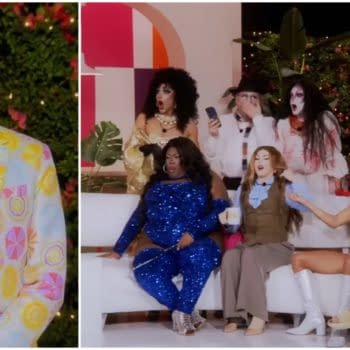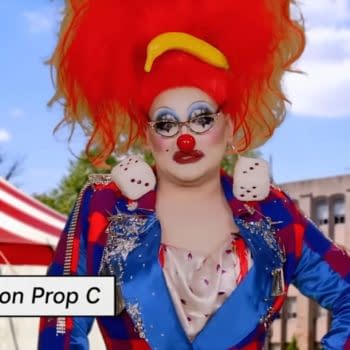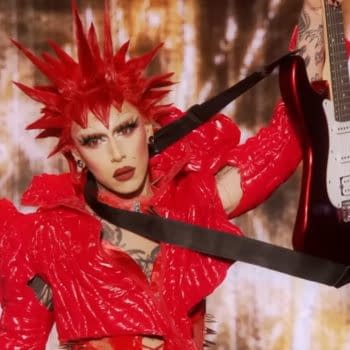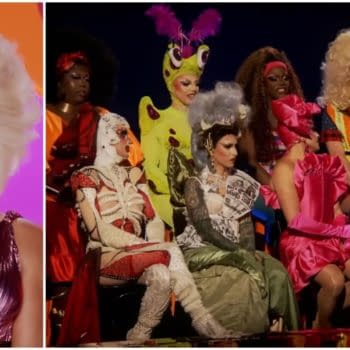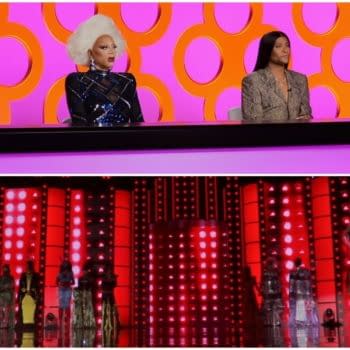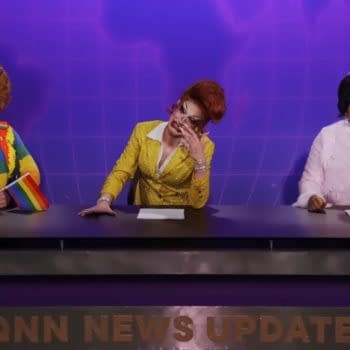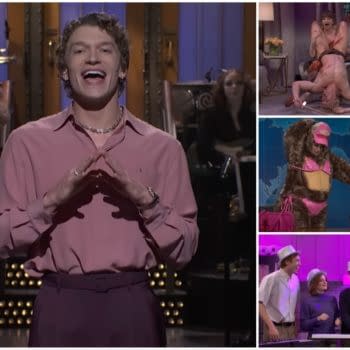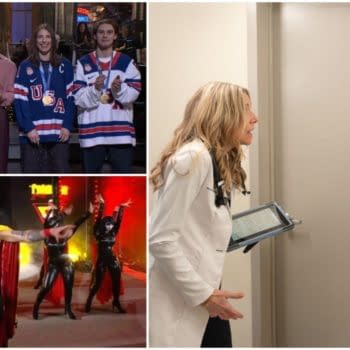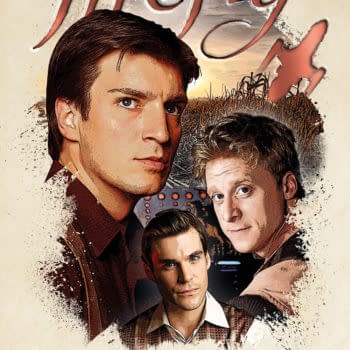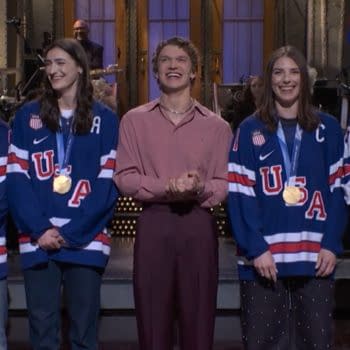Posted in: HBO, Review, Trailer, TV, Westworld | Tagged: Bernard, bleeding cool, cable, caleb, crisis theory, Delos, dolores, episode 8, HBO, Maeve, Man in Black, season 3, serac, streaming, television, tv, westworld, william
Westworld Review: Season 3 Finale Crisis Theory Goes Scorched Earth
Westworld officially ended their third season, and they most assuredly didn't go out with a whimper, but in true HBO fashion, they left us with a bang. On the off chance you opened this article without being caught up, you're more than welcome to keep reading, but you may be a little lost as far as themes and plot points. It really is a solid hour-ish of television and well worth the watch. But I'm not here to lecture you on your viewing habits; let's dive into thoughts on the finale, shall we?
First and foremost, let's cover the basics: the cinematography is top-notch, it feels fresh but never in an experimental way; it always felt like they knew exactly what they were doing and executed it perfectly. Next up is the cohesiveness of it all: everything works together seamlessly to create not only the world but add depth and dimension to the characters with a subtle nod towards realizations we have yet to put together in the show. This means costuming, set design, props, background actors – all of it is perfect, as usual.
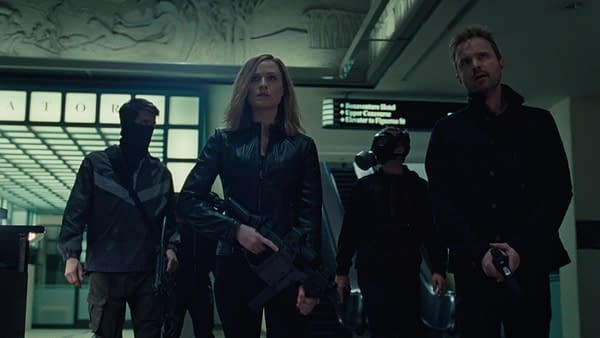
Now, I want to talk about the costumes in this season in particular for a moment: they're on some level the same, but the mechanics have shifted. The costumes are no longer coded black and white – in the park, you had a black hat (the bad guys) or a white hat (the good guys), and through the series, you could generally tell if you were looking out for it. They supplemented the characters, but now we see Dolores and Caleb in black, Charlotte in whites and champagne colors, and Jimmy primarily in white. As an added bonus, Ashley and Bernard stay in their classic black and white suits for most of when we see them. Does this match the dichotomy of good and bad we've known before? Is it backward? I think they've purposefully flipped things to show the gray areas of morality; no character (or person for that matter) is totally good or evil; we all exist in shades between.
I think the "color coding" this season toys with perception – everybody likes to see themselves as the being on the side that's right, but maybe Dolores and Caleb feel like they're betraying their kind, and they wear black as to blend into the shadows and do what needs to be done for the greater good. Charlotte-host (aka Halores) is in lighter colors until the car bombing, in which she starts to wear darker colors until the very end scene, which sometime later shows her in solid black. Could this be foreshadowing her as the villain for next season? Similarly to Dolores, Jimmy is in his white jumpsuit from the mental hospital for the majority of the time we see him, which is solid bright white. That tells us he firmly feels that he's on the side of right, and the more he tries to do the "right thing", the more blood-soaked and spattered his clothes become.
I could rant about the crafts of this show all day long, but there's one major thing that's a constant that absolutely should not be overlooked. The performances from every single member of the cast were sublime – the background actors populated a believable world in revolt and set the stage for the main cast to bring the storylines and character arcs full circle creating a perfect narrative journey, and stunts and VFX worked together to do the same that really helped breathe life into the whole thing.
Future Westworld Shows May Be Believable Because They Won't Be Different From Ours
Westworld's depiction of the future is different from others shown (most recently in Upload, which I watched over the weekend), but oddly enough, they're pretty alike on paper. A world where technology is extrapolated to a natural point: voice command in-ear Siri-like assistants, giant data and tech corporations ruling everything, self-driving cars, sleek architecture – it's the generic "modern futuristic" view of the future. So why does it feel like Westworld gets it right while everyone else who does it makes it seem like it's hokey and will be looked back on like the extremely dated future-views of the past? Yes, I'm looking at you, Star Trek. I'm not totally sure, but I think that it could be because Westworld eased us into it; from season one, they made it clear that this isn't just a decade down the line, it's very much the future. Technology feels natural but still fantastic, so the suspension of disbelief isn't asking so much of you – they know you have to accept 3D printed human-like AI, so they want the rest of the world to feel accessible.
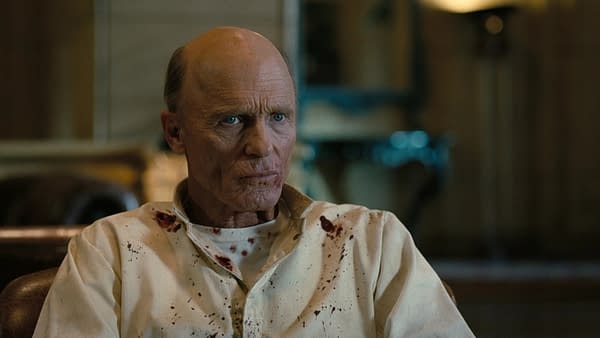
Now, bear with me as I bring this around to the real-world, and take off your tin-foil hats for goodness sake, you look ridiculous. However, Westworld has made a future society that feels real and so believable because it compares and extrapolates our current society a little too accurately for comfort. No, we're not subject to the cold hard data of a machine, and we won't be vanished by some for-hire criminals via an app, but we do put our trust in algorithms and willingly feed them our data. I'm not saying we're trading our future for a Buzzfeed quiz to find out which Disney Princess you are, but I am saying that we need to be more aware of exactly what the greater consequences and forces are in play here. Westworld alludes that our current Rheobaum is the media, which makes sense as a comparison and allegory. No, it's not saying that Anderson Cooper is going to show up at your house with a mind-control device and force you into doing anything, but it is spelling out a dangerous system that could wreck society and our freedom, both perceived and otherwise.
However our society developed to get the way Westworld depicts it, I like to see it as a warning of sorts to us that unless we make the change, humanity will suffer – there will be no Dolores to save us, no host-uprising to make us acutely aware of how dependent we've become on technology; nobody is coming to save us from what our creations of convenience will turn our society into. Humanity has to take back our right to absolutely free choice – not a perception of freedom that's ruled something or someone else.
Forgive my slight tangent here, but in case you weren't aware of the song that plays at the end of the episode, it's Pink Floyd's "Brain Damage", and it happens to be one of my absolute favorites. The song is about how the news twists our thoughts to fit its own agenda, but it's really the agenda of lunatics that we've willingly let into our homes and our heads. It's incredibly fitting for the season and encapsulates the message and feel of the episode, but it's also iconic for WestWorld in that it actually plays the lyrics of the song – at least the bridge.
"And if the dam breaks open many years too soon// And if there is no room upon the hill// And if your head explodes with dark forebodings too// I'll see you on the dark side of the moon."
Listening to those lyrics while seeing the future that technology – Delos, Incite, Rheobaum – engineered, there's a powerful catharsis in that. We may not be able to change the world right now anywhere near as drastic, but we can start by asking questions and thinking critically as to who we are giving our free choices to.
All in all, tonight's episode and the whole of season 3 of Westworld has been an absolutely amazing watch. It was topical, but not in an apparent way – and it proved it stood the test of time: it was developed, created, and finished all before the world even knew what a pandemic would be like, and somehow it feels like it was crafted subtly to give us hope and the spark of excitement we need to carry on. It gives me hope that shows can move forward and still be brilliant; it gives me hope that humanity is sturdy enough to outlast anything thrown at it. After all, hope is just another way of seeing the beauty in the world around us. I choose to see the beauty in this world as opposed to the ugliness.



